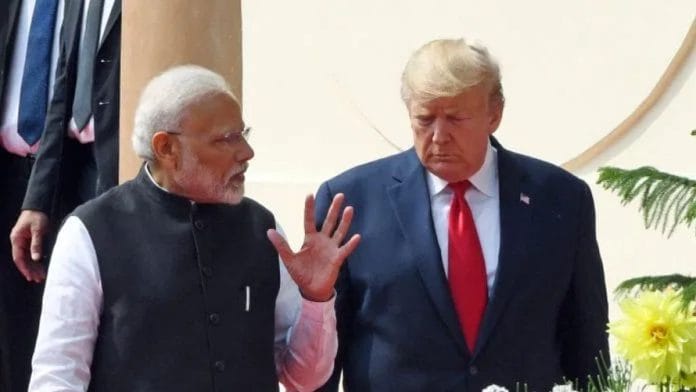Thank you dear subscribers, we are overwhelmed with your response.
Your Turn is a unique section from ThePrint featuring points of view from its subscribers. If you are a subscriber, have a point of view, please send it to us. If not, do subscribe here: https://theprint.in/subscribe/
When I recently came across a video of an American environmental agency sharing their concerns about the Indo–Pak war, I could not resist ruminating about the lesser-known consequences of nuclear wars and Americans’ performative concern around it. Climate change is unapologetically a global phenomenon. However, their deliberations on its impact to humankind, appears oddly narrow, especially from events unfolding thousands of miles away – portraying as environmentalists, victims of terrorism and an absolute power.
It is noted that, in a war between these two hostile neighbours, for unintended reasons, people die of starvation and failing health, far beyond the subcontinent, while primary devastations occur locally. But are wars inevitable, especially when a military monarchy spews terrorism on a democracy? However, in line with the aftermath of a war, their study says, it takes only about 2 weeks for the smoke to cover the entire globe and rise to altitudes between 20 and 50 miles, according to American Climatologists Alan Robock and Luke Oman. At that level, in the stratosphere, it would never rain, as the smoke would stay there for years. As an adverse implication, farming becomes difficult in European countries. The crops would die eventually owing to the failure of seasonal rains and extreme temperatures.
The study projects that the US itself is likely to lose 10 to 40% of the yields of corn, wheat and rice due to erratic weather patterns induced by wars. With food reserves lasting just 60 days sans replenishment, famine and malnutrition could claim one and two million lives globally. The temperatures would plunge below ice age conditions, as the world would gear up to enter nuclear winter.
USA –the selective environmentalists.
Americans’ negative perception of Iran and its military presence in the Middle Eastern country has earned global attention for a long time. Of late, the world witnessed an unprovoked, direct military intervention of the US on three nuclear facilities in Iran. Extending its support to Israel during a 12-day-long cross-border strike, the US’ urgency to evaluate its ecological cost was absent.
It is habitual for Washington to make environmental commitments, withdraw and re-join conventions. The Americans joined the Paris Agreement in 2016, envisaging reducing the emission of greenhouse gases by 28% by 2025. When President Trump cited economic burden in 2020, they withdrew, while the successive government, upon taking office in 2021, re-joined the agreement, signalling a global commitment to climate action. However, the cycle continued. Taking charge for the second non-consecutive term, Donald Trump, whom I call the predictably unpredictable opportunist, vowed to resign from the global pact, claiming its inability to meet the environmental objectives of the nation.
It is obscure if greens in the US had made any environmental calculations given their military actions on Iran, as it had unfailingly done when India struck Pakistan. Had they not struck a balance between war and ecology, is it environmental apathy, or have they entwined themselves with national interest? Yes, its nay hypocrisy, as it reflects and absurd in its own way.
Bid to revive global dominance.
Factors like decline in relative economic size, increased competition, rise of the Global South, and various geopolitical reasons are pushing the US to constantly revise their strategies. Nevertheless, the shift in universal dominance and the US losing its hegemony is palpable, with a troubled horse (if not right, it’s apt) as the head of the Federal government, fending to reposition. Environmental facades tend to fade away in the background amidst myriad of dangling pointers.
While environmental concerns are not to be seen as indifferent, as the global bandwagon is battling climate change and an emerging relative crisis, it becomes unaccountable in wars, especially involving concerns around national security.
India refused to condemn the US after it bombed Iran, rather asking Tehran, its strategic partner, to de-escalate the crisis. India abstained from making any comments in favour of a UN resolution, or taking no advantage of the situation to show multipolarity (which the US believes it possesses) in the world today.
Notwithstanding ecological adversities, like other counterparts, as nations are prioritizing its security, amidst an anarchic international system, the US is hitherto trying to spew green imperialism, also flanked by the Golden Dome.
About the author: Yukesh Saravanan is an independent researcher, environmentalist and a writer based in the Nilgiris, India. His work focuses on climate change, environmental policy, mountain ecology, history of indigenous communities and colonial impacts. He is also an active member of the United Nations Convention to Combat Desertification, Youth Caucus.
Email – yukesh.saravanan@gmail.com Phone – +919489322384
These pieces are being published as they have been received – they have not been edited/fact-checked by ThePrint.


